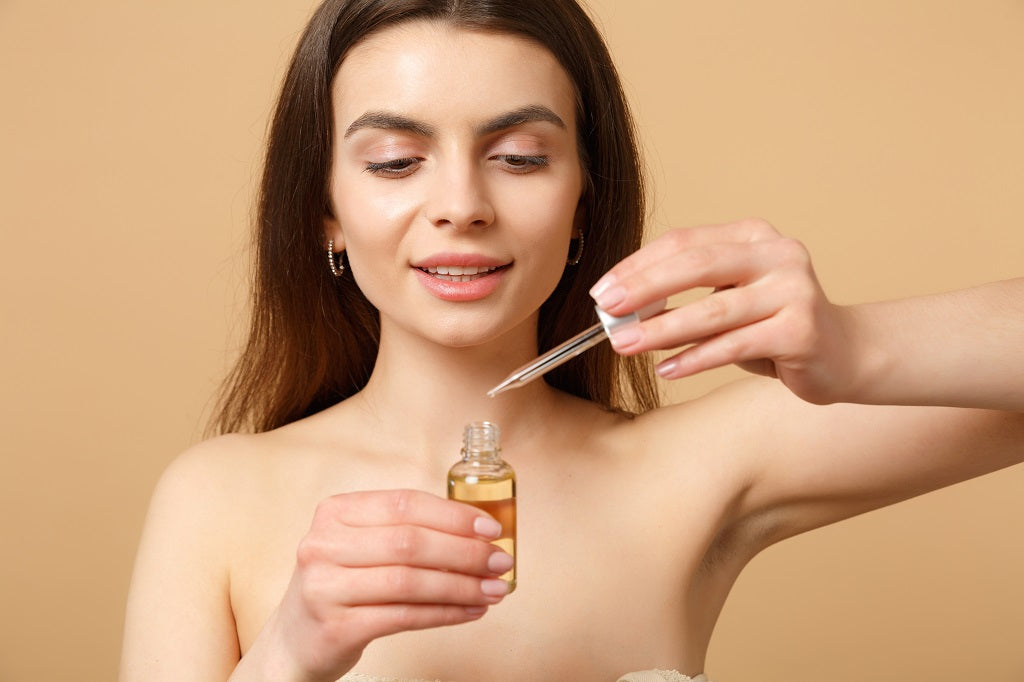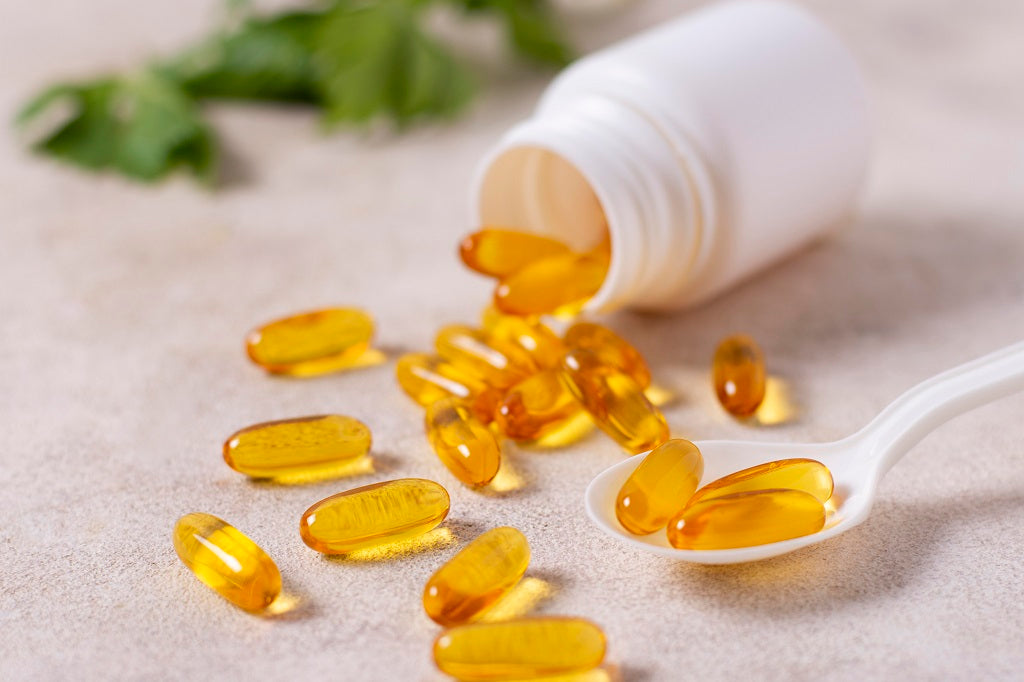Also known as liquid gold Moroccan Argan Oil is amazing for skin and hair. It protects the skin barrier and happens to be a very powerful anti-acne ingredient. This oil can easily double up as a nighttime moisturizer to create an occlusive layer that protects and nourishes the skin.
Moroccan argan oil, one of the most sought-after ingredients in the beauty world, is often overlooked because many of you may not be aware of its game-changing beauty benefits. We will explore the benefits of argan oil for skin and how to utilize it for healthy, glowing, and youthful skin.
What Is Moroccan Argan Oil?
Argan oil is extracted from the nuts of argan trees that grow in Morocco. This miracle oil is loaded with beauty benefits that help to maintain healthy skin and hair. Argan oil has been called "liquid gold" due to its deep yellow colour, and wide range of beauty benefits. Its proven properties include boosting skin health and hair health. This treasured beauty ingredient is high in antioxidants such as Vitamin E, and essential fatty acids and exhibits anti-inflammatory properties. These properties are beneficial for various skin concerns such as scars, blemishes, and dry and mature skin. This cold-pressed oil deeply moisturizes the skin, helping to reduce wrinkles. Being light-weight and non-comedogenic helps with acne as well. The benefits of argan oil for skin do not end here, its hydrating and nourishing property is particularly beneficial for dry, dull skin.
Also Read : Benefits And Uses Of Miraculous Argan Oil
MOROCCAN ARGAN OIL, COLD PRESSED ORGANIC, 100ML
- Great for CURLY HAIR & FRIZZY OR DRY HAIR.
- Regulates sebum and controls ACNE BREAKOUTS.
- Vitamin E & anti-oxidant rich – combats the SIGNS OF AGEING.
- Hydrates NAILS & LIPS
Benefits Of Argan Oil For Skin
You can use this natural oil for treating all major skin concerns. Let's take a deep dive into the skincare benefits of argan oil.
1. Rich In Antioxidants
Argan oil is rich in antioxidants such as Vitamin E and polyphenols which protect your skin from the damaging effects of environmental aggressors. The high level of antioxidants fight free radicals which are responsible for the appearance of age spots, blemishes and acne.
2. Keeps Your Skin Hydrated
There is a general misconception that only dry skin needs moisture, contrary to that all skin types require moisture. All skin types can benefit from argan oil because it keeps the skin hydrated and nourished.
3. Prevents Trans Epidermal Water Loss
Argan oil helps by forming a protective barrier over the surface of your skin, thus preventing water loss and keeping your skin hydrated for a longer time.
4. High Level Of Essential Fatty Acids
The high level of essential fatty acid in argan oil offers hydration and nourishment to your skin, while improving the texture and appearance.
5. Anti-Inflammatory Property
The high level of fatty acids in argan oil attributes to its anti-inflammatory property. It provides relief from dry skin conditions such as rashes, skin inflammation and dryness.
6. Boosts Elasticity
It restores the hydration level of your skin, improves the barrier function, while increasing the elasticity of your skin, offering younger-looking skin.
7. Reduces Stretch Marks
Argan oil improves the elasticity of the skin and with regular use, you will observe a visible reduction in stretch marks.
Also Read : How Following These Simple Practices Can Effectively Help Evade Stretch Marks
8. Regulates Sebum Production
Argan oil for skin is beneficial in controlling sebum production as it keeps your skin well-hydrated, by tricking your oil glands to produce less sebum.
Can Argan Oil Help With Acne?
The reason people break out is not that they have naturally oily skin, but because their skin barrier becomes dry, damaged, and inflamed. This can be due to exposure to harmful UV rays, pollution, and extreme climatic conditions which can take a toll on your skin health, making it look dry and dull. To compensate for the loss of moisture your skin secretes more oil/ sebum which gets clogged inside the pores, resulting in breakouts.
But argan oil is there for your rescue. Apart from its hydrating, healing, and nourishing properties, argan oil is lightweight and non-comedogenic in nature. Thus it won't clog the pores of your skin and it is beneficial for acne-prone skin as well.
Also Read : Argan Oil For Acne - Why And How To Use
Will Argan Oil Clog Your Pores?
Anything can block your pores, and this is especially true in the case of skin that has an inherent sensitivity to a particular ingredients. There are certain natural oils such as olive oil, and coconut oil which are known to be highly comedogenic in nature i.e they can clog your pores easily. But unlike these natural oils, argan oil is non-comedogenic in nature and is on the low end of the risk scale.
In fact in the comedogenicity rating scalp, out of 5 argan oil is zero. Due to its myriad skincare benefits, argan oil has secured its place in the premium range of beauty products. It is a primary ingredient in many moisturizers, anti-ageing face creams, under-eye creams and serums.
How To Use Argan Oil On Your Face?
It is a common misconception that all oils are moisturizers. In fact, oils are occlusives which trap the moisture under your skin, keeping your skin hydrated for a longer time.
According to experts, the best way to use argan oil is by applying it on damp skin. After showering may be an ideal time to apply it. Or you can use it by applying it over a moisturizer and massaging in circular strokes, to trap moisture in your pores keeping your skin hydrated for a longer time. Restoring the hydration level on your skin ensures healthy, flawless, radiant, and younger-looking skin. Moreover, argan oil gets absorbed into the skin easily, without leaving your skin greasy.
This miracle beauty ingredient that hydrates nourishes, fades scars, fights acne, and gives you flawless and radiant skin is a must-have in your beauty aisle.
Disclaimer: All the content on anveya.com/blogs is solely for information. It is not intended to be a substitute for professional medical advice, diagnosis or treatment. Always seek the advice of your physician or a qualified health care provider. The information, suggestion or remedies mentioned on this site are provided without warranty of any kind, whether express or implied.




